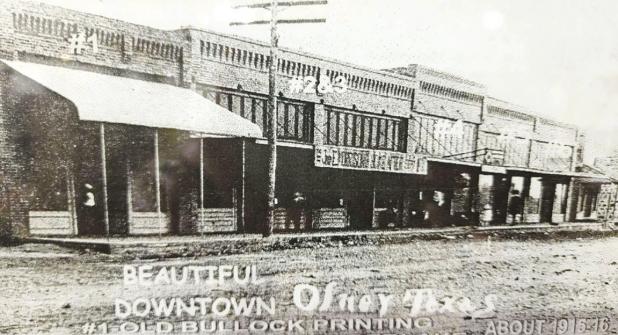
Museums to collect Olney family histories
historical record and potentially, a new Young County If you have a story to tell about the early days of Olney, or artifacts from that time to share, now is your chance to have it be part of the community’s museum.
Local historians will be gathering stories of the founding of Olney and the town’s early years as part of an oral history project to be housed at the Olney Heritage Museum, the Young County Museum of History and Culture and eventually the archives of Tarleton State University and the University of North Texas.
“We are creating a museum for Young County,” said Tony Widner, collection manager of the Young County Museum of History and Culture.“ We didn’t want the main story to be centered on one specific community or family. We wanted to cover every community in Young County and its unique history.”
The oral history project starts in Olney and the museum has “every intention of sharing those stories as soon as we get them finished with the archives here.”
Mr. Widner and other members of the museum staff will be at Olney Heritage Museum on Nov. 13-18 from 10 a.m. to 5 p.m. each day to record and videotape participants, and are taking appointments for the one-hour interviews.
If you have a story to tell about your family history in Olney, please call the Young County Museum of History and Culture at (940) 282-2887 to schedule an interview as soon as possible.
“We would really like to speak with some of the older members of the community, to hear them describe what it was like to live in and around Olney. “ Widner added. “To learn about history takes on a much more thought-provoking experience when you hear it told by the people who lived it. Written history doesn’t always capture the impact history has on a person’s life.“ “We would like for people to call ahead and schedule so they don’t have to wait,” he said. “These interviews usually take about an hour. We are asking them to tell their story - and the story of their family. After an initial introduction we hope they will feel comfortable and begin to talk about their families, and we will ask questions as they come up. We will record these visually and with audio. After the interviews, we will edit, polish it, and take out the rough spots (Coughs, long pauses, etc.). If they bring pictures of their family we will photograph and try to incorporate that into the video as well. We will ask the family to review the recording before it is published, and they will be asked to sign a letter granting the museum permission to present their story.”
UNT, which also holds past issues of the 115-year-old Olney Enterprise has contacted us, as well as Tarleton State University, and both have expressed interest in keeping these oral history video files in their searchable archives, “so anyone around the world could hear the stories of the people that made Young County from the families’ own voices,” Mr. Widner said.
The historians are looking for county artifacts from the 1800s to the 1950s – “items or artifacts that tell the story of Young County and explain how people used to live such as tools and clothes or items that highlighted a certain event,” he said.
“Some people have artifacts from when their family first moved here, photographs or family histories,” he said. “The verbal history: how the families got here and where they lived and who they were.”
Young County is rich in storylines, including those of Britt Johnson, a former slave whose wife was carried off in the Elm Creek Raid of 1864; of the Brazos Indian Reservation - the only reservation in the state of Texas; of Elizabeth Carter, the ‘Daniel Boone’ of Young County; and of the Mc-Neely brothers who set up a thriving ranching and rodeoing operation “before it ever became a big thing,” Mr. Widner said.
“The Birch family has had a ranch here for 150 years,” he said. “They’ve got interesting stories about the great-grandfather, grandfather, brothers,” he said. “It was more of a cattle area right off the bat in Olney because the water was a little more plentiful in that area.”
Mr. Widner spent time digging through historical documents at the Olney Community Library & Arts Center recently and learned that Wichita Falls founders Frank Kemp and Joseph Kell “took an interest in Olney townships and it looks like they were selling lots.”
He also learned that the Wichita Falls and Southern Railroad line extended to the area for Newcastle’s coal, and that Olney moved a mile from its founding location to access the railroad line.
He also found a letter written by “a man who used to pick up the mail and brought it to Olney before the town had a name.”
Mr. Widner encouraged everyone with knowledge or artifacts about the town’s early days to get in touch to share their stories.
